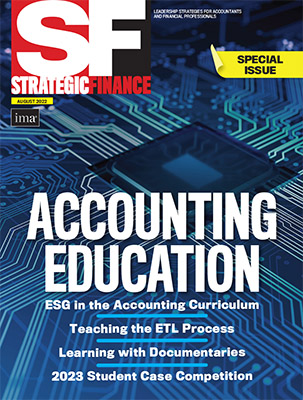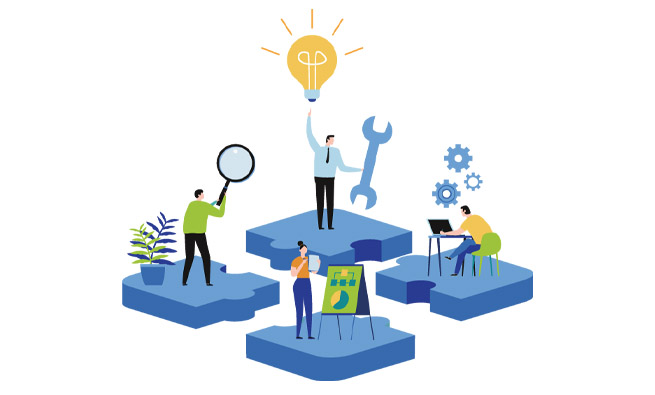Management consulting firm McKinsey & Company recently published a study of 56 foundational skills that will be needed to thrive in the future workforce. These skills were divided into four categories: cognitive, interpersonal, self-leadership, and digital. While all four categories are important, this column will focus on the fourth category: the digital skill set of the future and its implications for management accountants. The digital skill set category was broken into three skill groups: digital fluency and citizenship, software use and development, and understanding digital systems.
DIGITAL FLUENCY AND CITIZENSHIP
This skill group consists of four primary digital skills: collaboration, ethics, learning, and literacy. Broadly speaking, these types of skills pair perception and empathy with critical thinking and technical skills to incorporate insights into new strategic and operational practices. Digital collaboration skills quickly rose to the forefront during the pandemic. Suddenly, almost everyone had to be able to navigate videoconferencing software and cloud-based file-sharing systems, and also expand their comfort zone from email-based delivery to more real-time-based messaging architectures like Slack and Yammer. As some professionals have returned to a now-hybrid office, mastering these tools and their extensions will continue to be required of almost everyone in the workforce, including management accountants. Presentations will need to incorporate these tools, and formerly numbers-driven approaches will need to be tuned to maximize communication and understanding through visuals that are more easily consumed than traditional spreadsheets. Digital ethics skills require understanding the new ethical challenges brought on by an increasingly digital world. Management accountants will need to expand their understanding of how AI models work and the potential underlying biases that may be present in these, as well as the need to adhere to changing global and local privacy standards based on data they consume. Digital learning is the ability to create new knowledge by finding and amalgamating credible digital data sources. While in the past, it was often enough to wait for experts to perform this function and transmit these learnings via formal or on-the-job training, management accountants will be expected to seek out new sources of developing knowledge, apply them to a specific business or finance application, and lead the way in implementing changes driven by these new insights. Digital literacy means the capability to utilize digital data, leading-edge software, and interactions with AI modules to deliver new or deeper insights into potential business or finance strategies. For example, management accountants may need to develop new measurements or develop new models to deliver new environmental, social, and governance metrics. Or they may need to be able to utilize natural language technologies in conjunction with AI to parse social media or corporate press releases to develop new insights into customer behavior (and potential new revenue streams) or competitive strategies informed by utilizing these nontraditional digital data sources.SOFTWARE USE AND DEVELOPMENT
This skill group consists of computational and algorithmic thinking, data analysis and statistics, and programming literacy. This area leans into many of the traditional strengths already utilized on a daily basis by management accountants but demands a deeper dive into emerging technologies and methodologies. Computational thinking is the ability to translate real-world problems into models or algorithms to simplify processing for use by computers or other people. This is a skill that management accountants often apply today when developing spreadsheet models but may require them to increase their use of more advanced AI modeling tools in the future. Data analysis and statistics skills include the ability to build complex models able to handle high data volumes and disparate data types while using the right statistical methods and models to deliver actionable insights. Programming literacy will also be needed to develop these more complex models and/or work with those colleagues tasked with this work. Management accountants may find that their traditional analysis skills will become more important in quality testing and validating new models and programs developed.UNDERSTANDING DIGITAL SYSTEMS
This skill group consists of cybersecurity literacy, data literacy, smart systems, and technology translation and enablement. The focus of this group is on developing a deep understanding of data and being able to manage and protect it as well as communicate about and enable its use. Cybersecurity literacy includes understanding how to protect IT system assets and data from malicious intruders and what to do should the worst occur. Management accountants will need to work with IT to understand the processes, procedures, and technology required to protect against data security breaches, as well as develop the management and communication processes necessary to be invoked should a data breach occur. Management accountants have been entrusted with highly sensitive financial data, so they must also understand their role in building consumer trust and maintaining corporate brand equity in crisis situations. Data literacy skills require understanding the data life cycle: how data is created, acquired, validated, stored, and curated. This may require improving data governance processes or working with the corporate data governance group to refine old processes or create new ones. Smart systems will make much new data collection possible; consequently, management accountants will need to be fluent in this technology to utilize smart devices and sensors to collect new data and improve efficiencies within daily business processes. Internet of Things devices can be used to collect data from equipment or the manufacturing floor to provide real-time data analysis and feedback that can reduce the time needed to develop a product or proactively predict potential product failures in the field. Technology translation and enablement will factor heavily in the new digital world, and this is an important role for management accountants to play between financial experts and technology specialists. New digital opportunities will still need to be recognized, business cases will still need to be constructed for these opportunities, and business benefits will still need to be communicated in a clear and concise fashion. The management accounting role of the future will be significantly impacted by the digital skill sets identified by McKinsey: digital fluency and citizenship, software use and development, and understanding digital systems. It’s incumbent on all management accountants to consider the digital skills and associated human skills that they’ll need to acquire to continue to provide value to their employer. As evidenced by these skills, there will be a need for deeper technical skills in data governance, data privacy/security, process modeling, and application development/testing, especially when integrated with traditional finance skills like revenue generation and cost-efficiency management. A willingness to continually remaster these digital skills as technology changes, along with the ability to clearly articulate the value of the complex interactions between finance and technology, will position the management accountant for continued career growth and success.
August 2022



